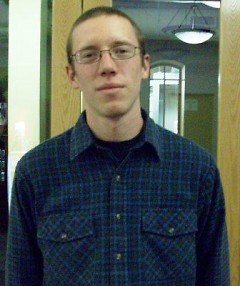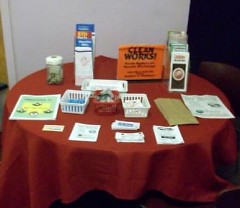I recently interviewed Steve Alsum. He is the coordinator for Clean Works, a needle exchange and disease prevention program that operates on Mondays and Thursdays out of Heartside Ministry. Clean Works is a ancillary program of The Grand Rapids Red Project.
The Grand Rapids Red Project, which was formerly HIV/AIDS Services, Inc., began in 1998. It started when eight friends gathered to discuss how they could help to meet the unmet needs of the community. One of the main needs the group identified was to reduce the incidence of HIV in the population of people who use intravenous drugs. The best way to solve this problem is to offer a syringe exchange program.
In August 2000, with the support of the mayor and the city commissioners, the HIV/AIDS Services, Inc. was granted permission to operate a harm reduction program with a syringe exchange component in the city of Grand Rapids. The program came to be known as Clean Works. Clean Works is one of only three legal syringe exchange programs in the state of Michigan and the only one on the west side of the state.
In the state of Michigan it is illegal to carry a syringe without a physician’s prescription. Physicians who prescribe syringe prescriptions to intravenous drug users are almost nonexistent. In the interest of public health the staff, volunteers, and clients of the Clean Works are granted immunity from the paraphernalia law.
“Drug overdose has consistently been the second leading cause of accidental death of all people ages 1-65 in Kent County,” Steve said.
The Kent County Medical Examiner’s Annual 2008 Report showed that in 2005, 60 people died of overdose, 66 in 2006, 65 in 2007 and 67 in 2008.
“This year looks to be a bad one as well,” Steve said.
Since starting the first legal overdose prevention and intervention program of its kind in the state of Michigan, Steve informs me that Clean Works staff and volunteers have facilitated 72 overdose prevention and intervention trainings for clients. Clients have reported to the Clean Works staff that it has led to 14 overdose reversals as a result of the knowledge and tools Clean Works provided.
“These are 14 people in the last year who could be dead right now if it were not for the access to the information and tools that Clean Works provides,” Steve said. “We are doing what we can to combat overdose in Kent County, but we cannot do it by ourselves. We need people to start to realize that this hidden epidemic is going on, and we need people to show they care if we hope to successfully address it.
The Michigan Department of Community Health reported that in January 2006 the reported number of people living with HIV or AIDS in Kent County was 621. In October of 2009 this increased to 765. In this same time period the number of people living with HIV or AIDS in Kent County who reported their main risk factor as being intravenous drug use decreased from 44 to 43.
“While the total number of people living with HIV or AIDS in Kent County has increased, the number of people living with HIV or AIDS who reported their main risk factor as being intravenous drug use has remained relatively constant,” Steve said. Steve believes this has been largely due to the access to sterile syringes that the Clean Works program provides.
Clean Works is largely a volunteer-run organization. They have a core of about six to seven dedicated volunteers and two staff members who volunteer much of their time.
“The best part of the job is the empowerment and the opportunity to give back to my community that it provides,” Steve says.
I asked Steve if there was some important information that are readers should know. Steve informed me that people who use injection drugs are a marginalized population in our society. Clean Works offers an environment where everybody is treated as human beings. Clean Works offers people the opportunity to begin making positive changes in an environment where they feel comfortable.
Recently, Clean Works has had some funding trouble due to a few reasons. First, the economy is not functioning well right now. Syringe exchange programs are not on the top of the financial help list. Second, until recently, there was a ban on federal funds being used to support syringe exchange programs even though federally funded reports have concluded that syringe exchange is effective in preventing HIV transmission and does not increase drug use. Syringe exchange is extremely cost effective and saves the public health care system enormous amounts of money for each HIV case averted.
I asked Steve if there was any way to help. Individuals wanting to donate can send checks payable to "The Grand Rapids Red Project" located at 343 Atlas SE, Grand Rapids, MI 49506. Steve asks that they please specify the donation be used for the Clean Works program. The Grand Rapids Red project also offers education related to HIV, Hepatitis C, overdose prevention, and outreach at community events. You can also donate online at www.redproject.org.
“The work we do is very necessary. We offer safe disposal of used syringes, thus protecting law enforcement, EMS workers, and the general community at large from contracting a virus through accidental needle stick injuries,” Steve said.
The Rapidian, a program of the 501(c)3 nonprofit Community Media Center, relies on the community’s support to help cover the cost of training reporters and publishing content.
We need your help.
If each of our readers and content creators who values this community platform help support its creation and maintenance, The Rapidian can continue to educate and facilitate a conversation around issues for years to come.
Please support The Rapidian and make a contribution today.



